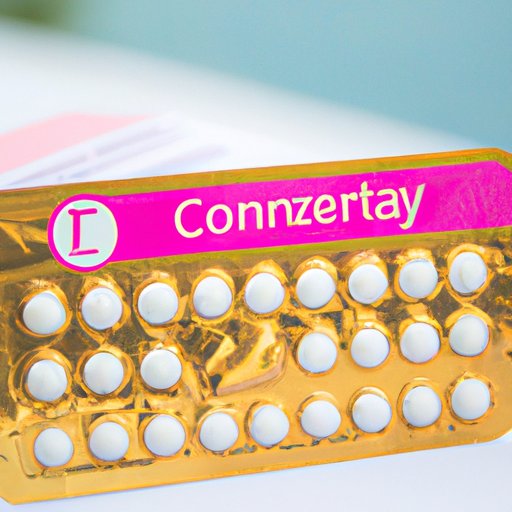Introduction
The birth control pill is a type of contraception used to prevent pregnancy. It works by using hormones to stop ovulation, which prevents eggs from being released. It also thickens the cervical mucus, making it harder for sperm to reach an egg. The pill is highly effective when taken correctly and can offer other health benefits as well.
Overview of the Birth Control Pill and How it Works
Birth control pills contain synthetic versions of two hormones found naturally in the body: estrogen and progestin. These hormones work together to prevent ovulation, which stops eggs from being released. They also thicken the cervical mucus, which makes it hard for sperm to enter the uterus and fertilize an egg. The pill is most effective when taken at the same time every day, as missing doses can increase the risk of pregnancy.
Types of Birth Control Pills Available
There are many different types of birth control pills available. Combination pills contain both estrogen and progestin, while mini-pills only contain progestin. Some pills are taken daily, while others are taken on certain days of the month. Your doctor can help you choose the type of pill that’s right for you.

Benefits and Risks of Taking the Pill
Pros
The pill is one of the most reliable forms of contraception and is more than 99% effective when taken correctly. It can also reduce menstrual cramps and make periods lighter, regular, and less frequent. In addition, the pill may reduce the risk of ovarian and endometrial cancer, as well as acne.
Cons
While the pill is generally safe, there are some risks associated with taking it. These include an increased risk of blood clots, stroke, and heart attack. Women who smoke or have high blood pressure should not take the pill. In addition, the pill does not protect against sexually transmitted infections (STIs).
How to Take the Pill for Maximum Effectiveness
Timing
To ensure maximum effectiveness, the pill should be taken at the same time every day. Missing doses increases the risk of pregnancy, so it’s important to be consistent. If you forget to take a pill, take it as soon as you remember and use a backup method of contraception until your next period.
Dosage
Most birth control pills come in packs of 28 tablets. 21 of these are active pills, while the remaining 7 are placebo pills that don’t contain any hormones. The active pills should be taken every day for 21 days, followed by the placebo pills for the remaining 7 days. During this time, you will have your period.
Other Considerations
It’s important to remember that the pill does not protect against STIs. To reduce the risk of infection, use a condom or other barrier method of contraception in addition to the pill. You should also talk to your doctor about any medications or supplements that may interact with the pill.

Tips on Choosing the Right Birth Control Pill for You
Consider your lifestyle
When choosing a birth control pill, consider your lifestyle. For example, if you’re someone who forgets to take their medication, you may want to consider a pill that is taken every day. On the other hand, if you don’t have a regular schedule, you may want to choose a pill that is taken on certain days of the month.
Consult with your doctor
Your doctor can help you choose the pill that’s right for you. They can assess your medical history and provide advice on which pill is the safest and most effective for you. If you have any questions or concerns about taking the pill, be sure to discuss them with your doctor.

Common Side Effects of Taking the Pill
Most women experience mild side effects when taking the pill. These include nausea, breast tenderness, mood swings, and weight gain. These side effects usually go away after a few months. If they persist or become worse, talk to your doctor.
Conclusion
The birth control pill is a highly effective form of contraception that can also offer other health benefits. However, there are some risks associated with taking it, so it’s important to talk to your doctor before starting the pill. With the right information and guidance, you can find the pill that is right for you and enjoy its benefits without putting your health at risk.
(Note: Is this article not meeting your expectations? Do you have knowledge or insights to share? Unlock new opportunities and expand your reach by joining our authors team. Click Registration to join us and share your expertise with our readers.)
